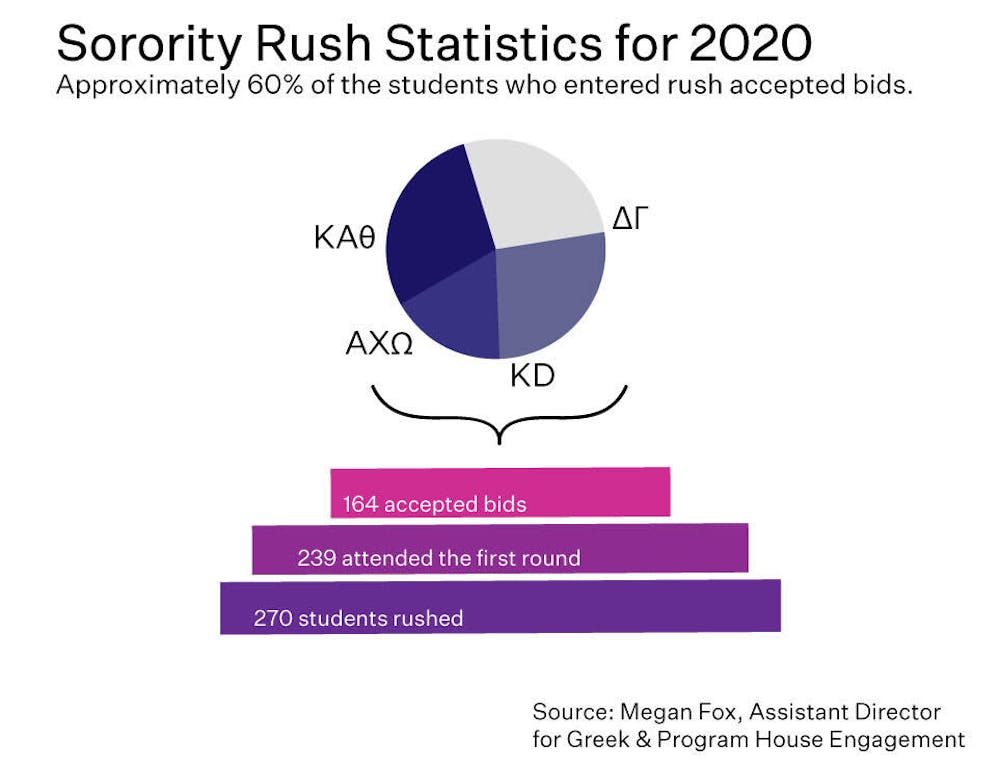Following three intense rounds of recruitment, 164 undergraduate students accepted bids into one of the University’s four nationally recognized sororities Monday.
Delta Gamma, which participated in its second formal recruitment since joining the University in 2018, welcomed 47 new members, the most of any sorority, according to Megan Fox, assistant director for Greek and program house engagement. Twenty-eight students accepted bids to Alpha Chi Omega, 44 to Kappa Alpha Theta and 45 to Kappa Delta.
Three rounds of sorority recruitment took place from Jan. 31 to Feb. 3. The first round, an open house, requires students to visit all four sororities.
“The recruitment process at Brown really favors open-mindedness … so it doesn’t really matter if they have a preference from the beginning,” said Lauren Reischer ’21, chapter president of KD.
After the first round, students narrow their focus to a maximum of three sororities for the second round, called “philanthropy night,” where the organizations highlight their charitable activities. By the third and final round, students may choose up to two sororities for “preference night” before receiving their bid.
“I definitely see it as a system where you can either get a lot or nothing out of it depending on what you put in,” said Leona Hariharan ’23, a member of the new AXO pledge class. “I felt like it was really quick. … There wasn’t much time for the sororities to really get to know us,” Hariharan added.
Reischer explained that the speed of the recruitment process, especially at first, requires that members “skip over chitchat and get straight to getting to know the girls and what they want out of being in a sorority.” KD looks for students that “are willing and excited to participate and share our values of inclusivity,” she added.
In accordance with these values, “we don’t tolerate any kind of discrimination, bullying or prejudices,” Reischer said. “We’re definitely not looking for girls to fill any type of mold.” With an understanding of the “historical whitewashing” of sorority recruitment, Reischer said they participate in diversity and inclusion training and recognize its importance. “We don’t try to fill a quota, because that is problematic as well, but we do try to make sure that people are not showing preferences to girls based on similarities they may have.”
Throughout the three rounds of sorority recruitment, students are encouraged to follow a dress code outlined in an “outfit guide” released by Panhellenic Council, the governing body of sorority recruitment at Brown. The dress code becomes progressively more formal with each new round. “I don’t know why there is a dress code,” Reischer said. KD “does not make our judgments based on appearance … we don’t want that to detract from getting to know you as a person.” Reischer also said that she had found the dress code concerning when she was rushing. “I have cerebral palsy, so I am on crutches, and physical appearance and body image (are) something I have struggled with my whole life.”
Reischer recognizes that Greek life at Brown is changing and believes it is for the better. “As we continue to improve our community, we see a more diverse set of women every year,” she said. Reischer is “proud to be the first woman with a disability to be president of a chapter at Brown.”
While the sororities are working on becoming more inclusive, not all students who registered end up in a sorority. Of the 270 students who registered for recruitment, 239 attended the first round, and 164 students received bids.
“A lot of girls ended up dropping out halfway through the process because they didn’t feel they needed it. … If you are passionate about their philanthropy and want to make lots of new girlfriends, then it’s the place for you,” Hariharan said. “But if you’re interested in finding lots of parties, you can do that without a sorority,” she added.
One of the disadvantages of holding sorority rush over the course of four days, according to Reischer, is that “it is a big time commitment, especially if you get invited back to the maximum number (of sororities) each round.” For example, round two of rush could last up to seven hours, she said.
This quick and intensive process for rush is relatively unique to sororities at Brown. Other Greek and program houses at the University have a much longer recruitment period, Fox said. These groups will have until Feb. 20 to recruit new members, in accordance with the timeline enforced by the Student Activities Office.
At other schools, recruitment tends to be even longer and more intense. “I think we do a good job at Brown keeping it more low stakes than some of the big southern schools,” Reischer said. She attributes this to the fact that Greek life at the University is a much smaller presence on campus than it is at other schools.
Overall, “we’re really thrilled about our new pledge class. This year, recruitment went overall really smoothly, and we can’t wait to see what else these girls will bring to our community,” Reischer said.





